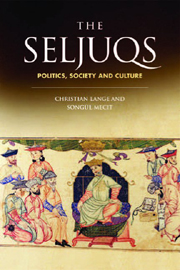Book contents
- Frontmatter
- Contents
- List of figures
- Acknowledgements
- List of abbreviations
- INTRODUCTION
- PART I POLITICS
- 1 THE ORIGINS OF THE SELJUQS
- 2 ASPECTS OF THE COURT OF THE GREAT SELJUQS
- 3 ‘SOVEREIGN AND PIOUS’: THE RELIGIOUS LIFE OF THE GREAT SELJUQ SULTANS
- 4 KINGSHIP AND IDEOLOGY UNDER THE RUM SELJUQS
- 5 SELJUQ LEGITIMACY IN ISLAMIC HISTORY
- PART II SOCIETY
- Part III CULTURE
- Index
5 - SELJUQ LEGITIMACY IN ISLAMIC HISTORY
from PART I - POLITICS
Published online by Cambridge University Press: 12 September 2012
- Frontmatter
- Contents
- List of figures
- Acknowledgements
- List of abbreviations
- INTRODUCTION
- PART I POLITICS
- 1 THE ORIGINS OF THE SELJUQS
- 2 ASPECTS OF THE COURT OF THE GREAT SELJUQS
- 3 ‘SOVEREIGN AND PIOUS’: THE RELIGIOUS LIFE OF THE GREAT SELJUQ SULTANS
- 4 KINGSHIP AND IDEOLOGY UNDER THE RUM SELJUQS
- 5 SELJUQ LEGITIMACY IN ISLAMIC HISTORY
- PART II SOCIETY
- Part III CULTURE
- Index
Summary
Even if such influential developments in the history of the Middle East as madrasas, Sunnism, and the use of Persian for official purposes did not originate in the Seljuq period, it was then that they grew and spread. Yet to what extent the Seljuq dynasty itself deserves credit for them is debatable, and one could argue that in many ways the sultans were but bystanders to historical processes over which they had little control. The institution of the atabegate, the guardians for royal princes, was perhaps a more genuinely Seljuq contribution, although its origins are so obscure that even this is questionable. More durable, and more certainly Seljuq, was the political legacy of the dynastic name itself, by linking themselves to which later rulers sought to add lustre to stories of their own origins. Throughout history, rulers have grappled with the question of how to justify their existence, and for new dynasties needing to explain the processes by which they have acquired the right to rule, this problem is always particularly acute. For centuries after the demise of the last Seljuq rulers of Anatolia, the Ottomans promoted their own legitimacy by claiming that they had inherited sovereignty from their predecessors, while their opponents tried to establish that they themselves were the Seljuqs' true heirs. In this chapter, we shall explore how the Seljuqs came to have such a lasting political influence on subsequent generations. In addition, nostalgia for the dynasty as well as political necessity gave rise to an important literature, with the composition of numerous Saljūqnāmas or ‘Books of the Seljuqs’ commemorating the dynasty's deeds, some of which are major historical sources.
- Type
- Chapter
- Information
- The SeljuqsPolitics, Society and Culture, pp. 79 - 96Publisher: Edinburgh University PressPrint publication year: 2011



